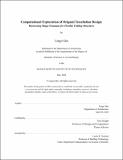Computational Exploration of Origami Tessellation Design:Harnessing Shape Grammar for Flexible Folding Structures
Author(s)
Qiu, Lingyi
DownloadThesis PDF (38.98Mb)
Advisor
Knight, Terry
Terms of use
Metadata
Show full item recordAbstract
Origami tessellation, with its intricate folding patterns, presents a unique blend of artistic expression and engineering application. However, the design process often proves daunting due to its complexity, limiting accessibility to enthusiasts and impeding its potential impact in engineering and architecture fields. This thesis aims to lower the barrier of origami tessellation pattern design by leveraging shape grammar principles. Shape grammar provides a systematic framework for generating and analyzing folding patterns, offering a more intuitive and structured approach to design. Through computational exploration and experimentation, this research demonstrates the efficacy of shape grammar in creating diverse and innovative origami tessellation patterns. By streamlining the design process, this approach not only enhances the experience for origami enthusiasts but also opens up new avenues for engineering and architecture applications, including deployable structures, flexible materials, and adaptive systems. The integration of shape grammar into origami tessellation design has the potential to catalyze advancements in both artistic expression and practical utility, fostering creativity and innovation in diverse fields.
Key words: computational origami design, origami tessellation, shape grammar
Date issued
2024-05Department
Massachusetts Institute of Technology. Department of ArchitecturePublisher
Massachusetts Institute of Technology